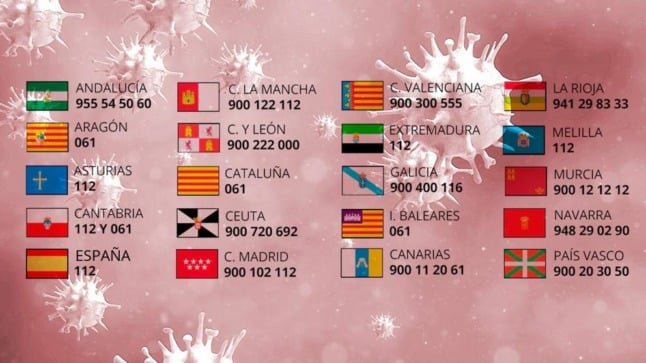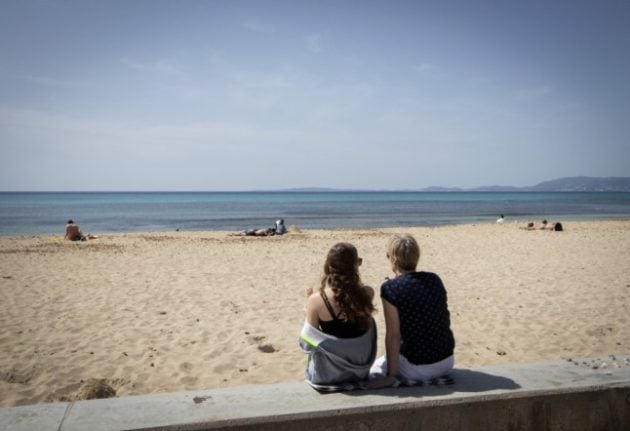If tourists or visitors develop Covid-19 symptoms while in Spain, they are required to self-isolate in their accommodation and avoid physical contact with other people.
Then they must contact the health authorities of the region they’re staying in, and based on their evaluation of the symptoms, they will ascertain whether the person in question has to take a Covid test.

If the test comes back positive, they’ll have to quarantine either at their hotel accommodation or wherever they are told to.
In the Valencia region’s case, hotels have set up self-isolation rooms for tourists who develop Covid-19 to stay in, so there is always accommodation available for them to lengthen their stay for the remainder of their quarantine.
It’s a measure to be taken seriously as those who break the self-isolation period face €30,000 fines from regional authorities.
In most cases, these Covid quarantine periods last ten days in Spain and are paid for by the tourists themselves.
Some tourists are only finding out they have Covid-19 when it comes to getting a Covid test to fly back to their countries, meaning they have to pay for an extra ten days entirely out of their own pocket.
READ ALSO:
- What happens when tourists get Covid-19 while on holiday in Spain?
- What to do in Spain if you think you have Covid or have come into contact with a positive case
However, some regions have factored in how the uncertainty of tourism and travel will dissuade many tourists from venturing abroad and have therefore decided to take action.
Andalusia, the Balearic Islands, the Canary Islands, Galicia and Murcia are the regions that have so far signed contracts with private insurance companies to provide travel insurance to tourists who fall ill with Covid-19.
Here are what the requirements are to access this benefit in the five regions that have made it available, and what it covers in each of them:
Andalusia
The Andalusian government offers free travel insurance to non-resident international tourists who travel to the southern region up until June 30th 2022 and stay in government-approved accommodation.
Unlike the other regions, they don’t offer this benefit to tourists who are Spanish nationals or residents.
The expenses Andalusia covers are medical, surgical and hospitalisation expenses in the case of contracting Covid, up to €4,000. It also includes possible transport and repatriation expenses, as well as the stay in Andalusia for a quarantine period of a maximum of 15 days and with a price limit of €5,000. To find out more, click here.
 Photo: Pau Barrena/AFP
Photo: Pau Barrena/AFP
The Canary Islands
The Canary archipelago has offered free travel insurance to tourists since the summer of 2020 through insurer AXA.
This covers healthcare expenses and accommodation for foreign and national tourists who visit the Canary Islands or travel between them, therefore also including Canary residents.
The insurance is activated in the event that the visitor tests positive for Covid while staying at tourist accommodation on the islands.
Although Canary authorities have not announced when the free insurance offer will end, they did extend their contract with AXA in August 2021, the previous agreement being in place since the previous summer. To read more about the insurance policy, visit the Canary tourism website here.
READ MORE: Spain’s Canary Islands give insurance guarantees to tourists in case of Covid-19
Galicia
Since June 2021 the northwestern region has offered free Covid travel insurance for visitors from outside the region through Europ Assistance, in order to “offer tranquility to tourists and Camino de Santiago pilgrims who visit the region”.
All visitors with residence outside Galicia who stay at tourist accommodation and who have not contracted the disease before arriving will be able to benefit from free coverage (find out more here).
In this case, Galicia takes on the health, accommodation or transportation costs derived from a Covid infection, including for the family members or companions of the traveller. The expenses they cover go from €500 to a maximum of €15,000 in the event of repatriation. Galician authorities also ask tourists who’ve been in high Covid infection areas in the past 14 days to register their details before travelling on their regional database here.
Similar to the Canary Islands, the government of Galicia has not said when the free insurance offer will end.
Murcia
The southeastern coastal region of Murcia has had Covid insurance in place for tourists through RACE Seguros since July 1st 2021 and is valid up until June 30th 2022.
It covers expenses derived from healthcare, travel and any extension of their stay due to self-isolation.
This applies to national and foreign tourists, as well as for the accompanying family members or people on holiday with the affected person, if they are staying at hotel accommodation regulated by the Murcian government. You can find out more on this page.
The Balearic Islands
In mid-August of 2021 the Balearic government launched its own comprehensive package of Covid travel insurance for tourists, however the policy was only available up until December 31st 2021.
At the time of writing, the free Covid travel insurance had not been extended to 2022 yet, but this could change.
To find out about updates on the Balearics’ free insurance policy, click here.
Other regions
If the region in which you will be staying in Spain doesn’t have free Covid insurance, keep in mind that the Spanish government travel website states that “in all cases, Spanish emergency healthcare services are guaranteed and provided at hospitals and healthcare centres”.
And even if you are staying in either Murcia, the Canary Islands, the Balearic Islands, Galicia or Andalusia, you should take out your own comprehensive travel insurance to be covered for all eventualities, not just Covid-19.
It’s worth noting as well that national tourists in mainland Spain are allowed to return to their homes in another region to self-isolate as long as they do it in a private vehicle and avoid all possible contact with others.
READ ALSO:



 Please whitelist us to continue reading.
Please whitelist us to continue reading.
Member comments